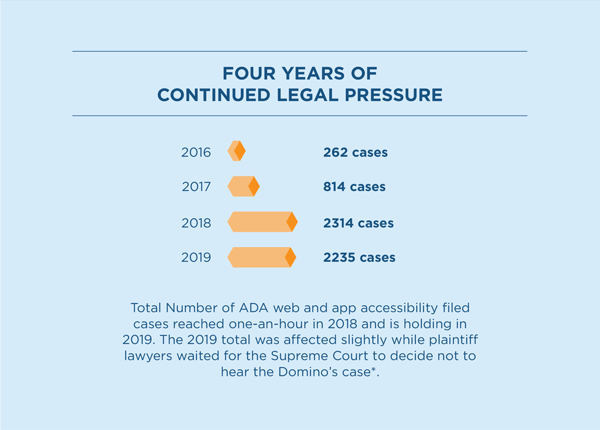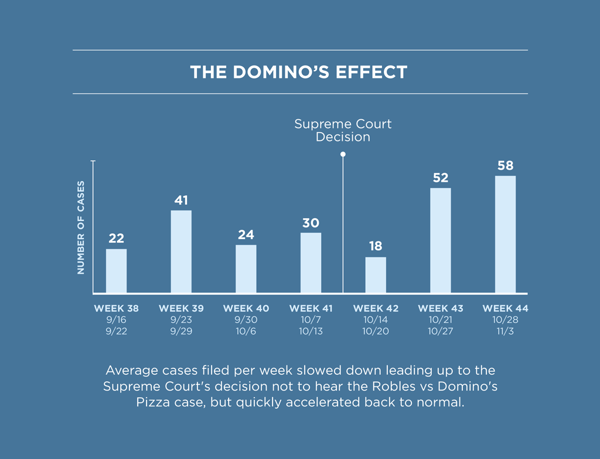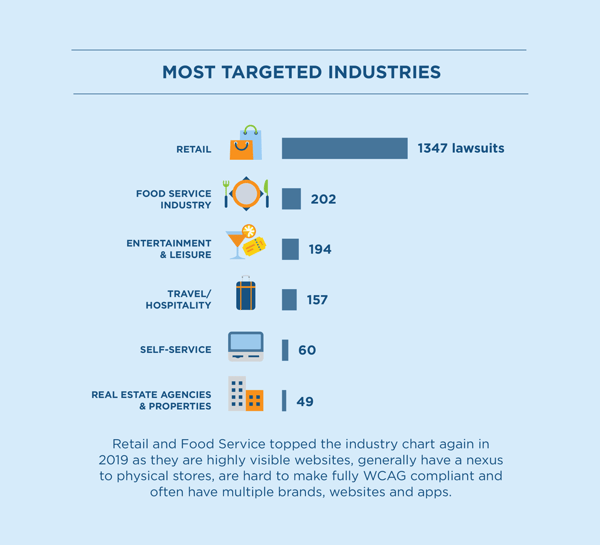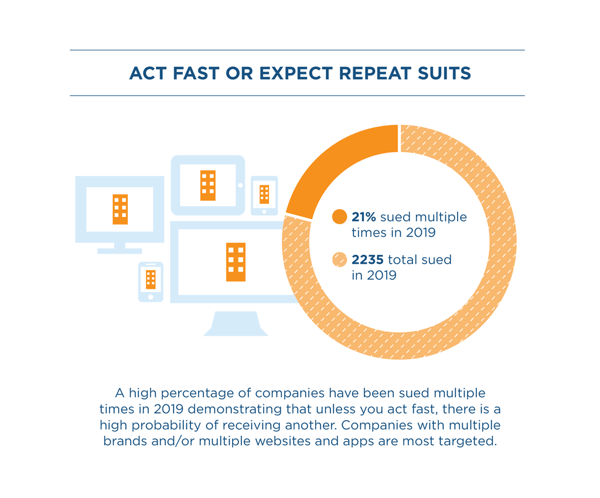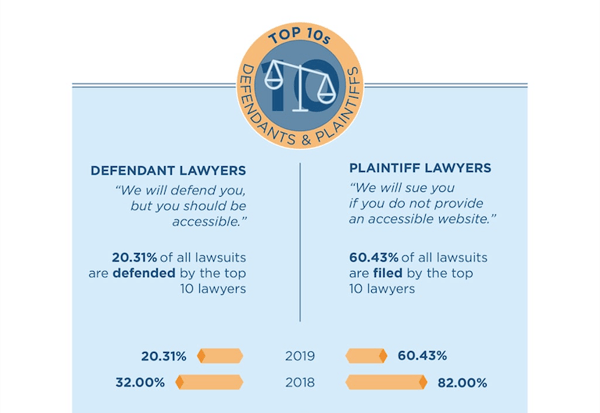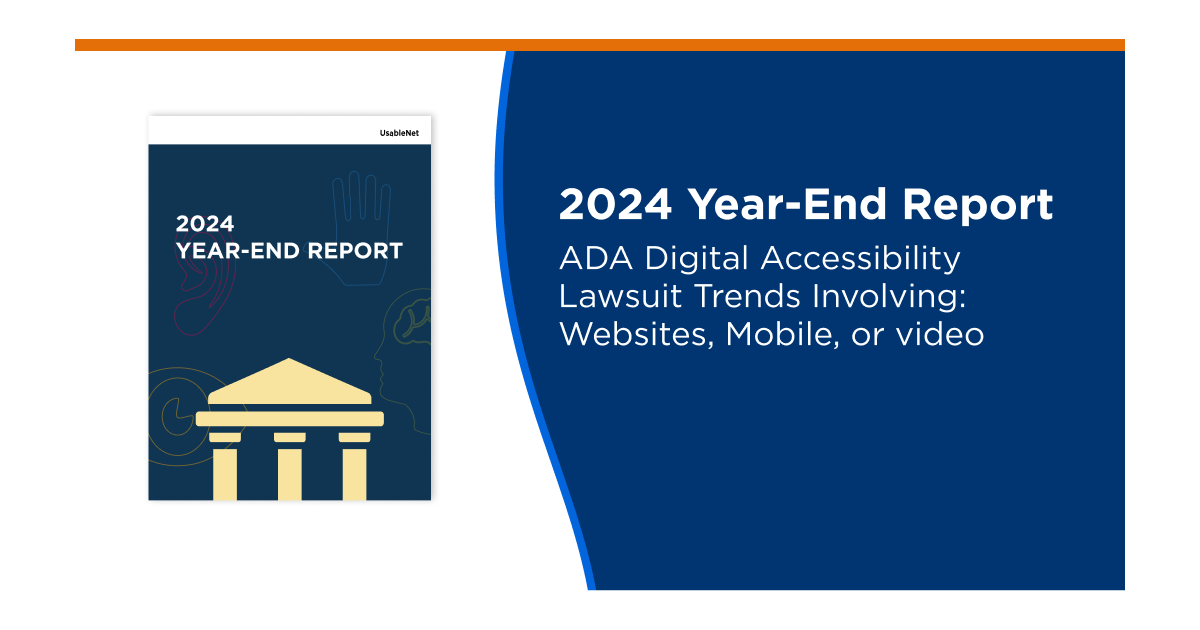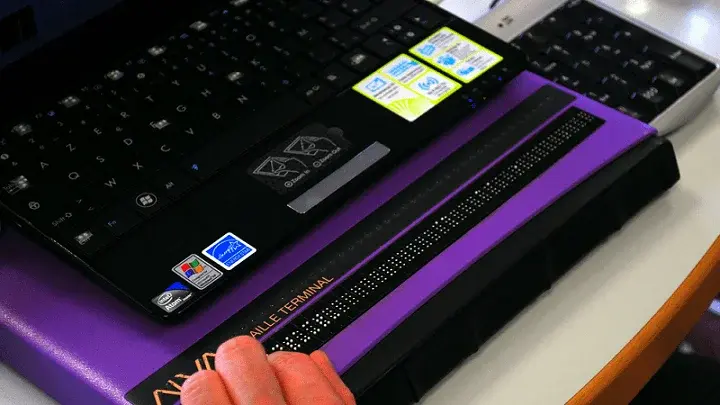Today, Dec 18th UsableNet releases its official ADA Web and App Lawsuit Recap Report for 2019. The highly anticipated report has become an annual source for businesses of all sizes, accessibility professionals, digital agencies, law firms, news outlets and all impacted by the thousands of ADA Website lawsuits filed over the last few years.
To create this report, the UsableNet research team monitors and documents all federally filed ADA based website and app lawsuits. The report itself depicts trends found in Website and App lawsuit cases. Data and images from this report can be shared when citing UsableNet as a source and linking to our Website.
In 2019, the UsableNet research team reviewed 2,235 new Website lawsuits and found:
- The rate of filing for ADA Website lawsuits continues at one-an-hour
- 66% of top retailers and 60% of top Restaurants received Website lawsuits
- 21% of lawsuits are against companies that have been sued in the past for digital inaccessibility
- New law firm Leaderboard
Download the report now or read below for a summary of findings.
"We provide this report to raise awareness of the current state of Website and App Accessibility and to help businesses start the important conversation about digital inclusion and better experiences for customers of all abilities" said Jason Taylor, Chief Innovation Strategist and Adviser to the UsableNet CEO.
Taylor also recently wrote a 2020 Digital Accessibility Prediction blog that discusses how lawsuits will affect the digital landscape.
No Relief in Sight
The rate of ADA Website lawsuits in 2019 was neck-and neck with 2018's historic rates. By midyear 2019, lawsuits were being filed at a rate of one-an-hour. Courts in New York and Florida saw more cases than others, but the lawsuits impacted businesses large and small, across industries and around the globe.
Leading up to when the US Supreme Courts decided not to hear the Robles vs Domino's case, filings seemed to slow. But they quickly rose back up to midyear levels again.
Image Description: Total Number of ADA Web and App Accessibility filed cases reached one-an-hour in year 2018 and is holding in 2019. The 2019 year total of 2,235 cases was slightly below the 2018 year total of 2314, due to plaintiff lawyers waiting for the Supreme Court to decide not to hear the Domino’s case. The previous year of 2017 total was 814 and the 2016 year total was only 262 cases.
The Domino's Effect
Weekly case filings slowed to an average of about 30 a week, a month prior to the decision by the US Supreme court not to hear the Domino's case. Once it was clear the Supreme Court would allow the decision by the lower courts to stand, the rate of lawsuits quickly rose again. As of mid December, filings were maintaining the one-and-hour, 8-a-day and over 40-a-week average reported by UsableNet at midyear 2019.
Image Description: Average cases filed per week slowed down to leading up to the Supreme Court's decision not to hear the Robles vs Domino's Pizza case but then quickly accelerated back up to 58 a week to make up for the gap.
Retail and Restaurants Sued Most Often
Analyzing all the lawsuits, two industries stood out in 2019: retailers made up 60 percent of all cases and food service related businesses made up 9 percent.
The biggest companies in these two industries were targets for plaintiffs and disability advocates. Since 2017, more than 66 percent of the top 500 retailers have been sued in federal court. In the restaurant and hospitality industry, 60 percent of the top 100 restaurant chains received a lawsuit in 2017-2019.
Image Description: Retail was the most targeted industry with over 60% of all cases (1347 cases). Second was Food Service with 202 cases, Entertainment and Leisure had 194 cases. Travel had 157 case. Self-service saw 60 cases and Real Estate had 49 cases.
Not Once, or Twice but Multiple Times
One 2019 trend that we identified as early as Q1, multiple plaintiffs are suing the same companies; 21% of companies received multiple Website lawsuits in 2019. For companies managing multiple brands and websites, this means being sued more than half a dozen times. Regardless of settlement agreements, until all websites are made accessible- companies are at risk for multiple lawsuits.
Image Description: 21% of all cases in year 2019 were companies sued multiple times, demonstrating that unless you act fast, there is a high probability of receiving another. Companies with multiple brands and/or multiple websites and apps are most targeted. There were a total of 2235 cases in year 2019 with 479 being companies sued for the second or multiple times.
The Legal Fight - over 1,000 Defending Lawyers
The Top Ten Defense and Plaintiff law firms are listed in the free report, but 2019 saw more law firms acting as legal advocates for the disability community. This dropped the top ten Plaintiff law firms' share of total cases from 82 to 60 percent, spreading the case load across more Plaintiff firms, but overall case numbers for 2019 stayed very close to 2018 levels.
On the Defendant side, more lawyers are counseling clients through website accessibility lawsuits and advising how to mitigate ongoing risk.
Image Description: 400 plus more lawyers have filed or defended an ADA web or app accessibility lawsuit during 2019. That has decreased the percentage of total that the top ten firms represent with the top ten Plaintiff Lawyers now representing 60 percent or all cases down from 82% in 2018. The top ten defendant law firms now represent 20% of all cases, down from 32% in 2018.
UsableNet's Take:
The main take-away here is that the fight for digital accessibility continues in the courts. Companies doing business online should move to a pro-active approach to improve accessibility and defend against Website lawsuits. Website Accessibility also provides an opportunity to build stronger relationships with the disability community, a growing population that wants to buy, engage and interact online.
The report also indicates that in the wake of Domino's, Federal court ADA Website filings are unlikely to slow. ADA legal experts predict that State-level lawsuits and demand letters will also increase in the coming year.
In 2019, we also saw select plaintiff attorney's return to sending demand letters before filing a lawsuit. This may be due to the strong precedent and record of quick settlements for Website lawsuit cases as reported in our midyear recap. Demand letters are not tracked as part of this report.
In many instances, lawsuits and demand letters became more specific in their complaints. The team also reported seeing more Mobile Websites as the base of the claim (not the desktop site) compared to previous years. Mobile claims were frequently supported with specific feedback about the plaintiff's use of an Android or iPhone. Many of the mobile claims provided specifics on how the inaccessibility issue impacted the plaintiff's ability to use the site.
Moving forward, plaintiff firms and disability rights advocates will likely continue to use both courts and demand letters. ADA-based Website and App lawsuits are unlikely to stop until companies of all sizes and and across industries create accessibility policies and build more inclusive experiences for websites and apps.
2020 will list likely see all the trends we reported this year continuing. UsableNet's research team will report and monitor these in the coming year.
Sources
* Data was collected up through December 16, 2019 (comparable to 2018) by UsableNet research team.*
* Retail list of top 500 used to check suit names was the Internet retail 500 2019 list.
*** Top Restaurant Chain list used was for Restaurant business online top 500.



